“Begin your day, Winnie.” In Samuel Beckett’s Happy Days, Dianne Wiest’s enviable range and talent captivates the audience and keeps us firmly in her grasp throughout this two-act play, which is no small feat considering the fact that when we meet her, she’s buried up to her waist in earth and has little to hide behind save a few props and only one other actor to work off of that doesn’t even make eye contact with her, until the end.
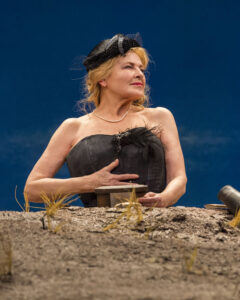
Dianne Wiest. Photo by Craig Schwartz.
The Center Theatre Group presents the Yale Repertory Theatre production of the Beckett play under the direction of James Bundy, Dean of Yale School of Drama and Artistic Director of Yale Repertory Theatre since 2002. For those unfamiliar with the play, Winnie (Wiest) and Willie (Michael Rudko) are alone in an expanse of symmetrical ‘scorched grass.’ He spends time in his unseen cave, which he should only safely enter by crawling backward, as Winnie reminds him, while she stands in the open, unable to move. To pass the time between the waking and the sleeping bells that clang loud enough to make this life they are leading feel like a tortured nightmare, Winnie rummages through her black bag for items that give her some small comfort in spite of them being almost completely used up [a medicine bottle, a lipstick] and talks – about the way things were in ‘the old style,’ about people from her past, and about their present situation, which she tries to characterize as filled with ‘many mercies.’
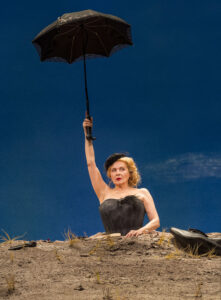
Dianne Wiest. Photo by Craig Schwartz.
The light is relentless and bright. The stories Winnie tells are disjointed, peppered with half or misremembered quotes. Willie would rather look at a pornographic photograph than at his, we assume, wife. They haven’t seen another human being in what feels like a long time. In other words, it’s Beckett bleak – and therefore, it is incredibly funny and sad. “No better, no worse, no change. No pain.” Winnie tells us, then follows a beat later with, “Hardly any.” Willie provides few answers to Winnie’s many queries and statements and there are moments where the exchanges land like a thrown barb on a sit-com. One could argue that Beckett’s characters are often as simple to get as any we’ve seen in that TV medium but though they may be defined by simple characteristics [Winnie speaks, Willie does not – Willie can crawl, Winnie cannot], the depth of feeling that is revealed over the course of their time on stage is immeasurable.
For the most part, Ms. Wiest seems to place Winnie’s voice at the upper end of the vocal range giving her a light, airy, pitched tone that all but says, ‘I mean no harm.’ When the emotion takes the character or the story turns on her unexpectedly, a sudden drop into her lower register is more impactful than a sea of tears could ever be and it makes us feel for this poor character that Beckett has trapped in a mound of what feels like years of disappointment. When Winnie asks the unseen Willie whose cave lies behind the mound of earth to Winnie’s right, to look at her, she says, “Oh I can well imagine what is passing through your mind, it is not enough to have to listen to the woman, now I must look at her as well.” It comes off as funny but, as does most of the play, it hits a surprising and timely nerve. The play is nearly 60 years old but the way it makes use of repetition and how Winnie expresses the way the day-to-day has worn her down just as overuse of her toothbrush has worn it down to almost nothing feels as immediate as if it were written yesterday.
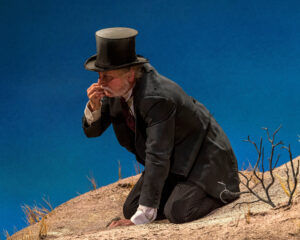
Michael Rudko. Photo by Craig Schwartz.
Among the many items in Winnie’s beloved black bag, there is a revolver. Before the end of the first act, Winnie decides to remove it from the bag and set it aside on the dirt nearby with the barrel of the gun pointed toward her. Anyone familiar with Anton Chekhov’s bit of advice about introducing a gun in the first act might smile and it is, admittedly, hard to forget it is there even though Winnie has no apparent compulsion to use it. Soon after the gun is placed, Winnie relates a story about Mr. Shower, “or was it Cooker?” – and a woman she assumed was his wife who walked past she and Willie some time past and wondered why Willie didn’t try to dig her out. The man demanded to know what it all meant, and his wife countered by asking ‘what’s the idea of you?’, a nod, perhaps, to all of the audience members who will become frustrated by yet another journey into Beckett’s mind on stage. One audience member in front of me stood up at intermission to complain that it was just a ‘bunch of monologues’ and she’s stuck there?, echoing Mr. Shower/Cooker but he returned for the second half – all of us hope for some kind of cathartic resolution after all.
The story is repeated in the second act, where we find that Winnie is now buried in earth up to her neck. It’s not enough to end her life, just enough to make it impossible for her to find comfort in her black bag and the many things that she is even too fearful to enumerate for us. Ms. Wiest as Winnie remains buried in this fashion until the end and manages to accomplish more with her face and voice than some would with the use of their full body and a bigger space. Her head is “full of cries” and she worries that Willie might have gotten trapped in his cave and died, it’s been so long since she’s heard from him.
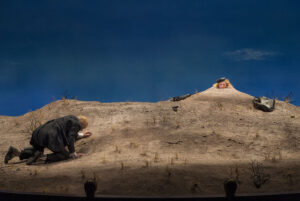
L-R: Michael Rudko (obscured) and Dianne Wiest. Photo by Craig Schwartz.
Willie returns, and his appearance is more than a little creepy as Mr. Rudko, now dressed in a ragged top hat and tails, shakily crawls out from behind the mound of earth and makes his way down a slope to face Winnie. His physicality is an unsettling delight that morphs into a comedic tour de force as he attempts to crawl back up the mound, desperate to reach either the gun or Winnie [tempted to assume the former] while Winnie regales him with questions regarding his intention. “Is it me you’re after, Willie… or is it something else? … Is it a kiss you’re after Willie… or is it something else?” There’s no relief for these two; the sun won’t take them, the earth won’t take them, the gun is out of reach. Touched by his apparent effort on her behalf, Winnie is elated, “Oh this is a happy day, this will have been another happy day! After all. So far.” She’s so thrilled she breaks into song, a tender rendition of “I Love You So” from The Merry Widow. The song ends. Her smile fades. The curtain eventually falls.
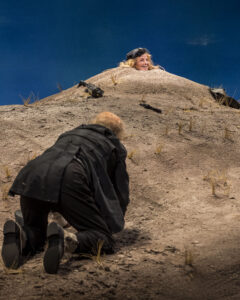
L-R: Michael Rudko (obscured) and Dianne Wiest. Photo by Craig Schwartz.
In the middle of act one, in one of Winnie’s many lovely moments, she tells us that, “sorrow keeps breaking in.” It does, both in life and in this production and we should be thankful for an experience as unique as this one that allows us a moment to honor that and maybe even process it. Later, fearful of what might happen if she is unable to talk herself through the time between sleeping and waking she worries, “Words fail, there are times when even they fail.”
Not this time.
Scenic Design is by Izmir Ickbal. Costume Design by Alexae Visel. Lighting Design by Stephen Strawbridge. Sound Design by Kate Marvin. Casting by Tara Rubin, CSA. Dramaturgy by Catherine Sheehy and Nahuel Telleria. The Associate Producer is Lindsay Allbaugh, the Production Stage Manager is Kelly Montgomery. The Stage Manager Helen Irene Muller.
Happy Days runs through June 30, 2019, at the Mark Taper Forum At The Music Center, 135 N. Grand Avenue in Downtown L.A. 90012. Tickets are available online at www.CenterTheatreGroup.org
This post was written by the author in their personal capacity.The opinions expressed in this article are the author’s own and do not reflect the view of The Theatre Times, their staff or collaborators.
This post was written by Christine Deitner.
The views expressed here belong to the author and do not necessarily reflect our views and opinions.

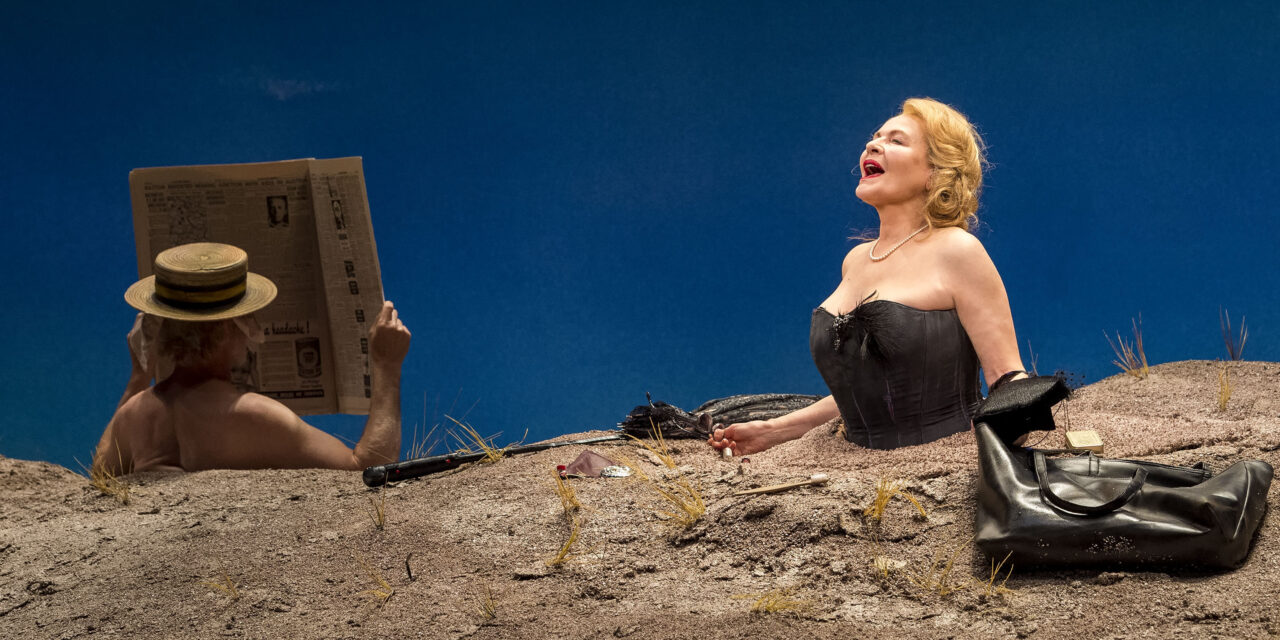
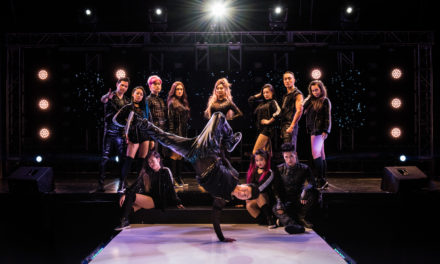
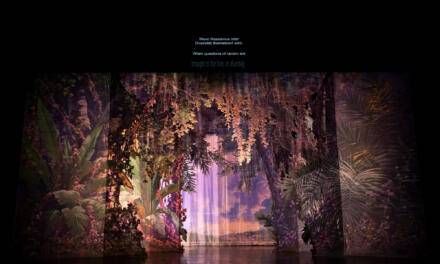

![Alice Birch’s “[BLANK]” at the Donmar Warehouse](https://thetheatretimes.com/wp-content/uploads/2019/10/image-3-440x264.jpg)












